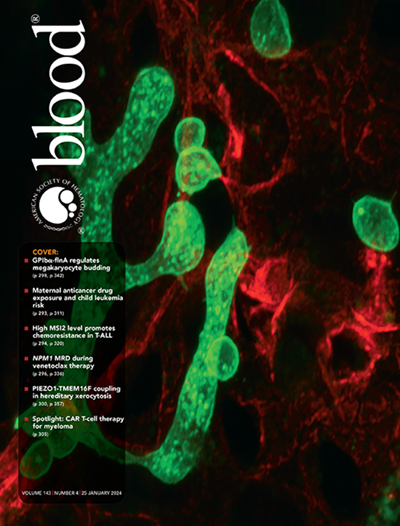platt -02和platt -03的结果:评估CD19 CAR - t细胞治疗和CD19表达T-APC对儿童B-ALL的支持
IF 21
1区 医学
Q1 HEMATOLOGY
引用次数: 0
摘要
该研究报告了PLAT-02在儿童和青年b细胞急性淋巴细胞白血病患者中的结果,这是一项scrii - car19的2期试验,这是一种具有FMC63 scFv和41BB共刺激的第二代CAR - t细胞产品;platt -03是一项通过连续输注表达截短CD19的T细胞(T- apcs)来评估外源性CD19抗原刺激的配套研究。platt -02的疗效队列(n=72例患者,中位年龄12.5岁)接受氟达拉平/环磷酰胺淋巴细胞清除,随后接受1X106 CAR+ T细胞/kg的剂量。mrd阴性的完全缓解率为89%。1年和2年无白血病生存期(LFS)的95% CI分别为0.71(0.58,0.81)和0.64(0.51,0.75)。低疾病负担患者的1年LFS显著较高(0.91比0.42)。与没有快速收缩的CAR - T细胞相比,输注后CAR - T细胞体内快速收缩与6个月内CAR - T细胞损失相关(分别为57%和19%)。最常见的3/4级不良事件包括细胞因子释放综合征(13%)和神经毒性(16%)。伴随试验,plat3,招募了26名患者,其中19人接受了t - apc。T-APC输注后未见细胞因子释放综合征和神经毒性。在CAR - t细胞快速收缩的患者中,T-APC输注改善了持久性(P=0.03),与早期CAR损失减少相关(20%输注T-APC对57%未输注T-APC)。基于这些试验结果,有必要进一步探索一系列人工CD19抗原暴露。普拉特-02 (NCT02028455)和普拉特-03 (NCT03186118)。本文章由计算机程序翻译,如有差异,请以英文原文为准。
Outcomes of PLAT-02 and PLAT-03: Evaluating CD19 CAR T-Cell Therapy and CD19-expressing T-APC Support in Pediatric B-ALL.
This study reports outcomes of PLAT-02, a phase 2 trial of SCRI-CAR19, a second-generation CAR T-cell product with FMC63 scFv and 41BB costimulation, in pediatric and young adult patients with B-cell acute lymphoblastic leukemia; and PLAT-03, a companion study evaluating exogenous CD19 antigen stimulation with serial infusions of T cells expressing truncated CD19, T-cell antigen presenting cells (T-APCs). The efficacy cohort of PLAT-02 (n=72 patients, median age 12.5 years) received fludarabine/cyclophosphamide lymphodepletion followed by a dose of 1X106 CAR+ T cells/kg. MRD-negative complete remission rate was 89%. Leukemia free survival (LFS) with 95% CI at 1 and 2 years was 0.71 (0.58, 0.81) and 0.64 (0.51, 0.75). Patients with low disease burden had significantly higher 1-year LFS (0.91 vs. 0.42). Rapid in vivo contraction of CAR T cells after infusion was associated with CAR loss within six months compared to those without rapid contraction (57% vs. 19%, respectively). Most common grade 3/4 adverse events included cytokine release syndrome in 13% and neurotoxicity in 16%. The companion pilot, PLAT-03, enrolled 26 patients, and 19 received T-APCs. Neither cytokine-release syndrome nor neurotoxicity were observed after T-APC infusion. T-APC infusion in patients improved persistence (P=0.03) with rapid CAR T-cell contraction was associated with decreased early CAR loss (20% with T-APC vs. 57% without). Further exploration of serial artificial CD19 antigen exposure is warranted based on these pilot results. PLAT-02 (NCT02028455) and PLAT-03 (NCT03186118).
求助全文
通过发布文献求助,成功后即可免费获取论文全文。
去求助
来源期刊

Blood
医学-血液学
CiteScore
23.60
自引率
3.90%
发文量
955
审稿时长
1 months
期刊介绍:
Blood, the official journal of the American Society of Hematology, published online and in print, provides an international forum for the publication of original articles describing basic laboratory, translational, and clinical investigations in hematology. Primary research articles will be published under the following scientific categories: Clinical Trials and Observations; Gene Therapy; Hematopoiesis and Stem Cells; Immunobiology and Immunotherapy scope; Myeloid Neoplasia; Lymphoid Neoplasia; Phagocytes, Granulocytes and Myelopoiesis; Platelets and Thrombopoiesis; Red Cells, Iron and Erythropoiesis; Thrombosis and Hemostasis; Transfusion Medicine; Transplantation; and Vascular Biology. Papers can be listed under more than one category as appropriate.
 求助内容:
求助内容: 应助结果提醒方式:
应助结果提醒方式:


